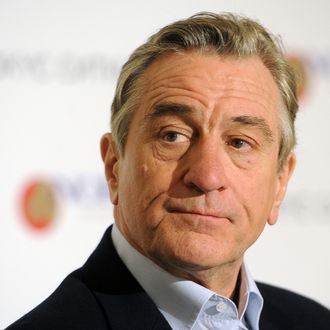
Last week’s tragedy in Newtown has reignited a national debate about why such shootings keep happening. Is it our permissive gun laws? A failure to identify and treat people with mental illnesses? Or — the inevitable question — are violent movies and video games to blame?
Robert De Niro’s new film, Silver Linings Playbook, doesn’t have any gun violence in it. But his canon — including classics like Taxi Driver, Goodfellas, and Heat — sure does. At a Peggy Siegal–hosted cocktail party for Silver Linings at Le Cirque on Wednesday night, we asked De Niro whether he believes some films are glorifying violence and inspiring real-life massacres. Actually, it may be the opposite, De Niro suggested.
“Movies can be like dreams for an audience,” De Niro told us. “They’re not real. They’re a release. And so people can look at a movie and wish they could be in that situation or identify with it — go after the bad guys, save the day — depending on what type of movie it is. And they know it’s only a movie, and it helps them to have a fantasy, even if it’s not real.”
However: “If somebody acts out on that, what can you do?” DeNiro asked. “It can stimulate anything in people who are crazy — I’m going to say crazy — in the first place. Or unbalanced.” (John Hinckley, who nearly succeeded in assassinating Ronald Reagan in 1981, was obsessed with Taxi Driver.)
Though not disowning his own violent films — “I’ve done them, and I’m committed to them” — De Niro says he’s really not a fan of over-the-top violence. “Personally, I don’t like a lot of violence, believe it or not,” he said. “I always feel that violence should be done in a way that it’s believable, real, and justified.” Of course, this isn’t always the case, he admits. “You’d like to think movies have some good intentions with violence, if you will, that there’s a reason for it, that it’s not gratuitous, but that doesn’t always happen.”
Noting how our perceptions of violence can vary, De Niro said he’s interested in the ongoing debate surrounding Zero Dark Thirty’s treatment of torture. “I want to go see it,” he said. “It’s a good question — how far can torture go? This movie seems to have been done with some thought behind it.”
Cracking down on gratuitous movie violence isn’t the answer — “You can’t infringe upon their rights” — but better gun control might be, De Niro says. “I think one thing that there should be is some regulation of guns,” he told us. “It’s crazy how almost anyone can get access to a gun. That itself is not so good.”
As for Newtown specifically, De Niro questions whether it was a good idea for Nancy Lanza to take her son Adam to a shooting range. “I was just told by somebody that it was a soothing way for them to connect,” he says. “And that’s interesting, but still, don’t take an unbalanced kid to a shooting range. Maybe I’m just being simplistic; I don’t really know the details. But take him to see animals and play with animals.”





























